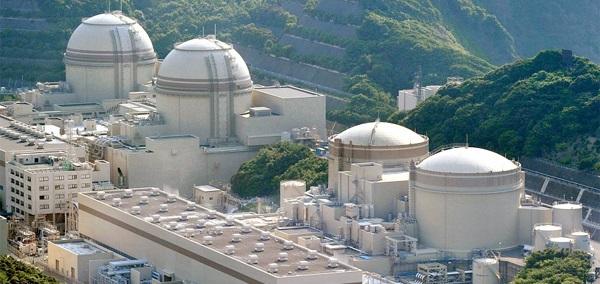
JAPAN'S NUCLEAR UP

REUTERS - Japan's consumption of liquefied natural gas (LNG) is set to fall as the country's nuclear reactors restart, with output from atomic power set for its highest since the aftermath of the Fukushima disaster.
Kansai Electric Power will restart the 870-megawatt (MW) No. 4 reactor at its Takahama station later on Friday, a spokesman told Reuters.
The Kansai restart followed Kyushu Electric Power bringing back the 890-MW No. 2 reactor at its Sendai plant on Wednesday. Kyushu now has four reactors running.
Each returning reactor will cut demand for LNG by as much as 1 million tonnes a year, said Kosho Tamura, a gas analyst at Japan Oil, Gas and Metals National Corp.
The return of Japan's nuclear capacity should lead to lower imports of fossil fuels, especially LNG. While that is a positive for Japan's utilities, especially as LNG prices are near four-year highs in Asia, the loss of Japanese demand could undermine the demand outlook for the global market.
Japan is the world's biggest buyer of LNG.
"It's a good thing that the power utilities in western Japan have restarted nuclear plants, which is leading to the cuts in fossil fuel costs, primarily LNG, through the continued operations of nuclear plants," said Tomoko Murakami, manager of the nuclear energy group at the Institute of Energy Economics, Japan (IEEJ).
Kansai is Japan's second-largest utility by sales and was the most reliant on nuclear power before the March 2011 Fukushima disaster, when a nuclear power plant owned by Tokyo Electric Power suffered meltdowns after an earthquake and tsunami.
Before the disaster, Japan had the world's third-largest reactor fleet which provided about one-third of its electricity. But the plants were shut down for relicensing after Fukushima highlighted regulatory failings.
Kansai will have three units operating and expects to have another reactor at Takahama restarted in November after shutting it down earlier this month for maintenance and refueling, its spokesman said.
Those three units will save about $1.5 billion in fuel costs each year they are running, the Kansai spokesman said, declining to comment on what fuels it would substitute.
Operating Kyushu's nuclear units will save the company about $2.2 billion in annual costs based on current LNG prices, its spokeswoman said.
With two more reactors likely to restart by the end of the year, when Japan enters its peak demand period, as much as 9 million tonnes of LNG demand could be replaced by nuclear operations.
The country's use of LNG in power generation has been declining this year as more reactors return. In June, LNG imports fell to the lowest monthly amount since May 2016 and for the year through to July are down 2.4 percent.
The Fukushima disaster sparked the country's worst energy crisis in the post-war period, forcing it to import record amounts of LNG and driving prices to record highs. Utilities also turned to cheaper coal imports.
-----
Earlier:

2018, August, 20, 14:05:00
MITSIBISHI BUYS 25% BALNGADESH LNGPLATTS - Japan's Mitsubishi has agreed to acquire a 25% interest in Bangladesh's Summit LNG import project, which includes a floating, storage and regasification unit, with the remaining 75% held by Summit Corporation, the Japanese LNG trader said in a statement late last week. |

2018, August, 17, 11:40:00
U.S. LPG FOR JAPAN UPREUTERS - Japanese utilities and industrial companies are snapping up U.S. cargoes of liquefied petroleum gas (LPG) that are seeking a new home after Chinese buyers started to shun them amid an escalating trade war between Washington and Beijing. |

2018, August, 10, 10:15:00
ADNOC - JAPAN RELATIONSHIPOG.COM - “For more than four decades, the UAE and Japan have enjoyed a deep rooted and successful strategic relationship, underpinned by long standing energy partnerships,” Dr Al Jaber said. “ADNOC is keen to further strengthen the relationship, deepen partnerships and seize growth opportunities along the full oil and gas value chain. |

2018, July, 4, 12:01:00
THE NEW JAPAN'S ENERGY PLANWNN - A new basic energy plan that sets goals for Japan's energy mix to 2030 and presents scenarios to 2050 was today approved by the Cabinet. Under the plan, nuclear will remain a key energy source, accounting for 20-22% of the country's electricity generation up to 2030. |

2018, May, 23, 10:10:00
CLEAN NUCLEAR FUTUREWNN - The United States, Canada, and Japan are launching the Nuclear Innovation: Clean Energy (NICE) Future Initiative. This global effort will make sure nuclear has a seat at the table during discussions about innovation and advanced clean energy systems of the future. |

2018, April, 25, 09:55:00
ASIA'S LNG DEMANDREUTERS - global liquefied natural gas (LNG) imports have risen 40 percent since 2015, to almost 40 billion cubic meters (bcm) a month. Growth accelerated in 2017, with imports up by a fifth, largely because of rising demand in China, but also in South Korea and Japan. |

2018, April, 2, 09:20:00
JAPAN'S OIL IMPORTS DOWN 15%REUTERS - Japan’s crude oil imports last month fell 15.4 percent from a year earlier to 2.99 million barrels per day (13.33 million kilolitres), the lowest for the month of February since 1969 |





